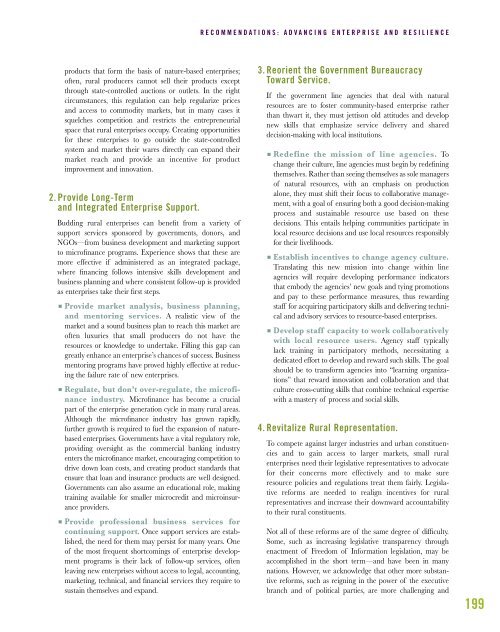Growing the Wealth of the Poor - World Resources Institute
Growing the Wealth of the Poor - World Resources Institute
Growing the Wealth of the Poor - World Resources Institute
You also want an ePaper? Increase the reach of your titles
YUMPU automatically turns print PDFs into web optimized ePapers that Google loves.
R E C O M M E N D A T I O N S : A D V A N C I N G E N T E R P R I S E A N D R E S I L I E N C Eproducts that form <strong>the</strong> basis <strong>of</strong> nature-based enterprises;<strong>of</strong>ten, rural producers cannot sell <strong>the</strong>ir products exceptthrough state-controlled auctions or outlets. In <strong>the</strong> rightcircumstances, this regulation can help regularize pricesand access to commodity markets, but in many cases itsquelches competition and restricts <strong>the</strong> entrepreneurialspace that rural enterprises occupy. Creating opportunitiesfor <strong>the</strong>se enterprises to go outside <strong>the</strong> state-controlledsystem and market <strong>the</strong>ir wares directly can expand <strong>the</strong>irmarket reach and provide an incentive for productimprovement and innovation.2. Provide Long-Termand Integrated Enterprise Support.Budding rural enterprises can benefit from a variety <strong>of</strong>support services sponsored by governments, donors, andNGOs—from business development and marketing supportto micr<strong>of</strong>inance programs. Experience shows that <strong>the</strong>se aremore effective if administered as an integrated package,where financing follows intensive skills development andbusiness planning and where consistent follow-up is providedas enterprises take <strong>the</strong>ir first steps.■ Provide market analysis, business planning,and mentoring services. A realistic view <strong>of</strong> <strong>the</strong>market and a sound business plan to reach this market are<strong>of</strong>ten luxuries that small producers do not have <strong>the</strong>resources or knowledge to undertake. Filling this gap cangreatly enhance an enterprise’s chances <strong>of</strong> success. Businessmentoring programs have proved highly effective at reducing<strong>the</strong> failure rate <strong>of</strong> new enterprises.■ Regulate, but don’t over-regulate, <strong>the</strong> micr<strong>of</strong>inanceindustry. Micr<strong>of</strong>inance has become a crucialpart <strong>of</strong> <strong>the</strong> enterprise generation cycle in many rural areas.Although <strong>the</strong> micr<strong>of</strong>inance industry has grown rapidly,fur<strong>the</strong>r growth is required to fuel <strong>the</strong> expansion <strong>of</strong> naturebasedenterprises. Governments have a vital regulatory role,providing oversight as <strong>the</strong> commercial banking industryenters <strong>the</strong> micr<strong>of</strong>inance market, encouraging competition todrive down loan costs, and creating product standards thatensure that loan and insurance products are well designed.Governments can also assume an educational role, makingtraining available for smaller microcredit and microinsuranceproviders.■ Provide pr<strong>of</strong>essional business services forcontinuing support. Once support services are established,<strong>the</strong> need for <strong>the</strong>m may persist for many years. One<strong>of</strong> <strong>the</strong> most frequent shortcomings <strong>of</strong> enterprise developmentprograms is <strong>the</strong>ir lack <strong>of</strong> follow-up services, <strong>of</strong>tenleaving new enterprises without access to legal, accounting,marketing, technical, and financial services <strong>the</strong>y require tosustain <strong>the</strong>mselves and expand.3. Reorient <strong>the</strong> Government BureaucracyToward Service.If <strong>the</strong> government line agencies that deal with naturalresources are to foster community-based enterprise ra<strong>the</strong>rthan thwart it, <strong>the</strong>y must jettison old attitudes and developnew skills that emphasize service delivery and shareddecision-making with local institutions.■ Redefine <strong>the</strong> mission <strong>of</strong> line agencies. Tochange <strong>the</strong>ir culture, line agencies must begin by redefining<strong>the</strong>mselves. Ra<strong>the</strong>r than seeing <strong>the</strong>mselves as sole managers<strong>of</strong> natural resources, with an emphasis on productionalone, <strong>the</strong>y must shift <strong>the</strong>ir focus to collaborative management,with a goal <strong>of</strong> ensuring both a good decision-makingprocess and sustainable resource use based on <strong>the</strong>sedecisions. This entails helping communities participate inlocal resource decisions and use local resources responsiblyfor <strong>the</strong>ir livelihoods.■ Establish incentives to change agency culture.Translating this new mission into change within lineagencies will require developing performance indicatorsthat embody <strong>the</strong> agencies’ new goals and tying promotionsand pay to <strong>the</strong>se performance measures, thus rewardingstaff for acquiring participatory skills and delivering technicaland advisory services to resource-based enterprises.■ Develop staff capacity to work collaborativelywith local resource users. Agency staff typicallylack training in participatory methods, necessitating adedicated effort to develop and reward such skills. The goalshould be to transform agencies into “learning organizations”that reward innovation and collaboration and thatculture cross-cutting skills that combine technical expertisewith a mastery <strong>of</strong> process and social skills.4. Revitalize Rural Representation.To compete against larger industries and urban constituenciesand to gain access to larger markets, small ruralenterprises need <strong>the</strong>ir legislative representatives to advocatefor <strong>the</strong>ir concerns more effectively and to make sureresource policies and regulations treat <strong>the</strong>m fairly. Legislativereforms are needed to realign incentives for ruralrepresentatives and increase <strong>the</strong>ir downward accountabilityto <strong>the</strong>ir rural constituents.Not all <strong>of</strong> <strong>the</strong>se reforms are <strong>of</strong> <strong>the</strong> same degree <strong>of</strong> difficulty.Some, such as increasing legislative transparency throughenactment <strong>of</strong> Freedom <strong>of</strong> Information legislation, may beaccomplished in <strong>the</strong> short term—and have been in manynations. However, we acknowledge that o<strong>the</strong>r more substantivereforms, such as reigning in <strong>the</strong> power <strong>of</strong> <strong>the</strong> executivebranch and <strong>of</strong> political parties, are more challenging and199
















